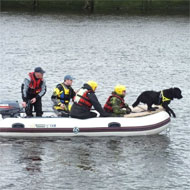
Scientists from the University of Leicester are working with UK police dogs to improve the identification of human remains in criminal investigations.
Led by PhD student Jonathon Brooks, the research team are looking at the chemical aspects of decomposition and the volatile organic compounds (VOCs) that are given off as biological matter decomposes.
They hope to establish which chemicals the dogs are detecting and whether it is one compound or combinations of compounds. Researchers will then work with professionals, using these substances to train victim recovery police dogs to locate human remains.
Mr Brooks explained: “As human remains break down, these small molecules are released into the surrounding environment, many of which can be detected by dogs.
“Depending on the conditions, different compounds will be released, so police search dogs need to be able to recognise a vast array of molecules.”
Researchers found that different tissue types decompose at different rates, but share similar VOC profiles. The environment that the tissue is exposed to can significantly change this VOC profile, which suggests the samples often used by police forces do not fully represent buried human remains.
The University of Leicester project is the only one in the UK to apply multidimensional chromatography to the understanding of decomposition. The team are currently supporting cadaver dog training in the UK as police forces are often very limited as to which samples they can use, which can reduce their effectiveness during investigations.
“Within the UK we are restricted to the use of animal samples in both research and police dog training, due to current legislation,” Mr Brooks said.
Protocols are currently being introduced to allow police forces to use human samples donated from hospitals, in order to increase the dogs’ reliability and effectiveness. This is yet to be implemented, however, and it is not known how regular or consistent the supply will be.
Researchers are now working closely with university hospitals of Leicester and multiple police forces across the UK, to establish how the data can be used in future criminal investigations.
Image courtesy of Jonathon Brooks/University of Leicester



 The latest
The latest